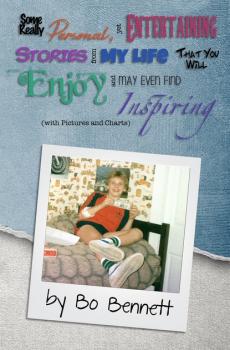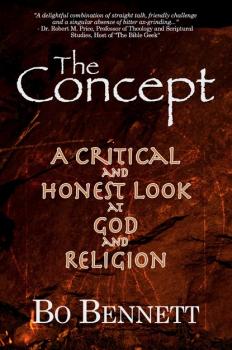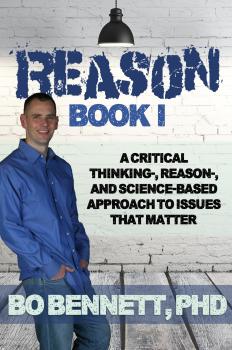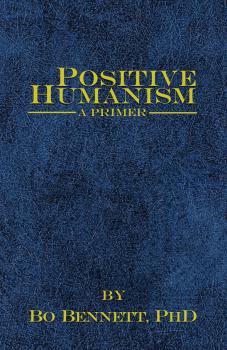ТОП просматриваемых книг сайта:
Bo Bennett
Список книг автора Bo BennettSome Really Personal, Yet Entertaining Stories From My Life That You Will Enjoy and May Even Find Inspiring - Bo Bennett
Аннотация
What is a "normal childhood?" Does it include almost being murdered by your sister with an ax? Speeding around town in the back of a station wagon because your mom is chasing an "alien spaceship"? Being busted by the police for intent to light a pond on fire? Tackling your mom to the ground and wrestling a knife out of her hand because she was trying to kill your dad? While my stories may be unique, readers will be able to relate to the broader themes are part of a normal childhood such as sibling rivalry, eccentric parents, doing stupid things, and frequently preventing one's parents from literally murdering each other.<br><br>Although some of the subject matter is not something one would generally laugh at, you have my permission to laugh. Social rules don't apply here; my rules do. It works for me, and who knows, after reading the stories from my past, you might be inspired to see your own screwed up past in a more humorous light.
Аннотация
Maybe you were born to Christian parents and raised as a Christian. Or maybe you are just a part of a Christian nation. You might have attended church regularly, or maybe just on special occasions. If asked, you say that you believe in God, but you really never thought about what that means exactly. You are a well-educated person who accepts the idea of Biblical miracles, but only the more "reasonable" ones. You have read some of the Bible, mostly just parts of the New Testament, but never committed to reading the Bible cover to cover. You are a good person who admires the many "Christian values" as demonstrated by Jesus Christ. But something does not feel right. <br><br>* Science tells us that the universe is 13.7 billion years old, but the Bible tells us it's 6,000 years old.<br><br>* Science tells us life is the result of emergent properties in combined molecules, and we have evolved from a very primitive life form, but the Bible says that God made us, as is, from dust, and blew life in our noses.<br><br>* You see a world where little bunnies burn to death in forest fires, and wonder why an all-good and loving God would allow such a thing to happen.<br><br>* You pray to God and you realize that sometimes your prayers are answered, and sometimes they aren't – just as if you didn't pray at all.<br><br>* You hear about other religions and wonder why your religion is right and every other religion on the planet is wrong.<br><br>* You have a real problem with the idea of all your non-Jesus-believing friends and family spending eternity in Hell.â¨<br><br>In fact, the more you look around, the more you see a world absent of this perfect image of a perfect God. As much as you want to avoid critical thinking and "just let go and have faith", you find that you cannot believe in something contrary to your logic and reason – no matter how much you want to. This might lead to feelings of guilt, insincerity, and/or hypocrisy. Yet you just can't imagine living life without God, and you don't have to.<br><br>When you start asking serious questions about God and religion, you begin to see through the stories of people living inside the stomachs of big fish, 900-year-old men, and bodies coming back to life after three days, and understand how man created God, and not the other way around. By daring to question "sacred" religion, challenging your childhood beliefs, and risking eternal damnation (okay, so there might be a minor side effect to reading this book), you will discover an appreciation for religion on a new level, as well as a renewed appreciation for the human race.<br><br>Through a unique blend of science, philosophy, theology, and a touch of humor, you will see how you can trust your logic and reason, be true to yourself, and embrace God – not as a being, but as a concept – The Concept.
Аннотация
This book is based on the first two years of The Dr. Bo Show, where Bo takes a critical thinking-, reason-, and science-based approach to issues that matter with the goal of educating and entertaining. Every chapter in the book explores a different aspect of reason by using a real-world issue or example.<br><br>Part one is about how science works even when the public thinks it doesn't. Part two will certainly ruffle some feathers by offering a reason- and science-based perspective on issues where political correctness has gone awry. Part three provides some data-driven advice for your health and well-being. Part four looks at human behavior and how we can better navigate our social worlds. In part five we put on our skeptical goggles and critically examine a few commonly-held beliefs. In the final section, we look at a few ways how we all can make the world a better place.
Аннотация
Positive humanism is an applied secular humanistic philosophy based on the scientific findings of positive psychology that focuses on personal, professional, and societal flourishing. As an applied philosophy its focus is on ideas that lead to increased well-being. As a secular humanistic philosophy, there are no appeals to the supernatural, the magical, or the mystical. The philosophy is founded on reason and critical thinking. The philosophy is science-based, meaning it is void of the unsupported and/or exaggerated claims and the constant confusing of correlation with causality often found in the self-help genre. The philosophy is grounded in the theories of positive psychology, which is the study of the positive side of the mental health spectrum–human flourishing.




